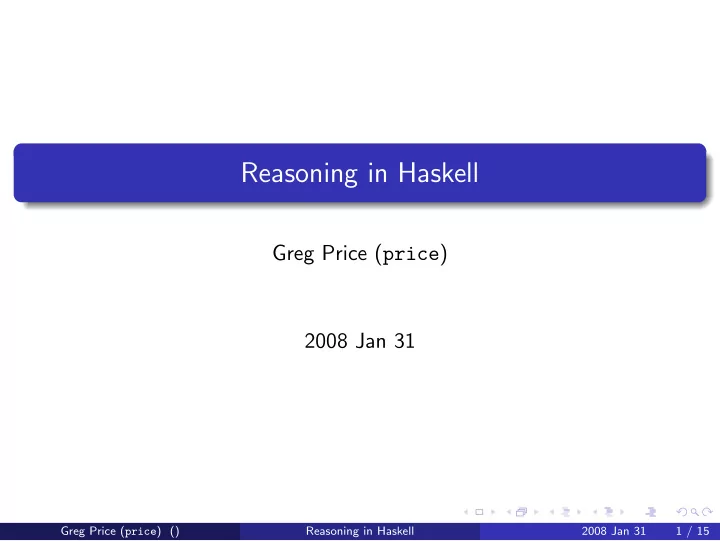

Reasoning in Haskell Greg Price ( price ) 2008 Jan 31 Greg Price ( price ) () Reasoning in Haskell 2008 Jan 31 1 / 15
Reasoning in Haskell: Hindley-Milner Types C: void qsort(void *xs, int, int, int cmp(void*, void*)) Haskell: qsort :: (t -> t -> Int) -> [t] -> [t] ( ∀ t ) H-M type allows type variables, universally quantified (with ∀ ) automatic type inference —never need declare a variable’s type! lexical distinction by caps: variable , Fixed map :: (a -> b) -> [a] -> [b] all :: (a -> Bool) -> [a] -> Bool takeWhile :: -- ? (.) :: (b -> c) -> (a -> b) -> (a -> b) ($) :: -- ? Greg Price ( price ) () Reasoning in Haskell 2008 Jan 31 3 / 15
Reasoning in Haskell: IO Actions Haskell pure , evaluation no side effects, always same so putStr "hello" :: IO () returns an “ IO action” some actions produce values: getLine :: IO String composite actions: do { x <- action1; action2; action3 x } ultimately execute an action by calling it main do { name <- getLine; putStr $ "Hi, " ++ name ++ "\n" } -- or reformat as do name <- getLine putStr $ "Hi, " ++ name ++ "\n" -- complete program: #!/usr/bin/runhaskell main = putStr "hello world\n" Greg Price ( price ) () Reasoning in Haskell 2008 Jan 31 5 / 15
Reasoning in Haskell: More Actions readTVar v :: STM a an STM action execute STM actions using atomically :: STM a -> IO a keep an s as state: get :: State s s, put :: s -> State s () run a State s action with evalState :: State s a -> s -> a typical language interpreter in Haskell: interpret statements as actions atomically (do x <- readTVar v y <- readTVar u return (x-y) ) :: IO Int Greg Price ( price ) () Reasoning in Haskell 2008 Jan 31 7 / 15
Reasoning in Haskell: Monads monad : a genre of actions, like IO or STM or State Int must have a way to make trivial actions: return :: a -> MyMonad a a way to chain actions: do { ... } to be useful, primitives and a way to carry out actions do {x <- act1; act2 x} is sugar for act1 >>= (\x -> act2 x) so return :: a -> m a, (>>=) :: m a -> (a -> m b) -> m b algebraic laws: (return x) >>= f ≡ f x , others inspiration, name, laws come from category theory Greg Price ( price ) () Reasoning in Haskell 2008 Jan 31 9 / 15
Reasoning in Haskell: Type Classes type class : an interface or constraint on a type, like “is a monad” class (..constraints..) => MyClass t where ..methods.. similarly instance to implement the interface -- in Prelude: class Monad m where return :: a -> m a (>>=) :: m a -> (a -> m b) -> m b -- in Control.Monad.State: newtype State s a = State { runState :: s -> (a, s) } instance Monad (State s) where return x = State $ \s -> (x, s) m >>= f = State $ \s -> let (x, s ✬ ) = runState m s in runState (f x) s ✬ Greg Price ( price ) () Reasoning in Haskell 2008 Jan 31 11 / 15
Reasoning in Haskell: Type Classes II classics Eq, Ord, Num ; stringifying Read, Show Monad instances are higher-kind types like IO :: * -> * literal 1 means fromInteger 1 :: Num a => a (as we noticed) instances may rely on constraints, posing a logic problem > :t 3 3 :: (Num t) => t > :i fromInteger class (Eq a, Show a) => Num a where ... fromInteger :: Integer -> a instance (Eq a, Eq b) => Eq (a, b) where (a, b) == (a ✬ , b ✬ ) = (a == a ✬ ) && (b == b ✬ ) > ("hello", (False, ✬ c ✬ )) == ("hello", (False, ✬ c ✬ )) True Greg Price ( price ) () Reasoning in Haskell 2008 Jan 31 13 / 15
Reasoning in Haskell: Algebraic (& your own!) Data Types ADT: data MyType tyarg = Branch1 | Branch2 Int [tyarg] take apart with case exp of pat1 -> body1 ; pat2 -> body2 or write a case as “equations” if is sugar for case .. of True -> .. ; False -> .. can give names to members, making gettors data Bool = True | False -- built in data List a = Nil | Cons a (List a) -- but sugar is nicer last :: [a] -> a last [] = error "oops" last [x] = x last (x:xs) = last xs data Queue a = Queue {hd :: Int, tl :: Int, a :: Array Int a} > :t hd hd :: forall a. Queue a -> Int Greg Price ( price ) () Reasoning in Haskell 2008 Jan 31 15 / 15
Recommend
More recommend